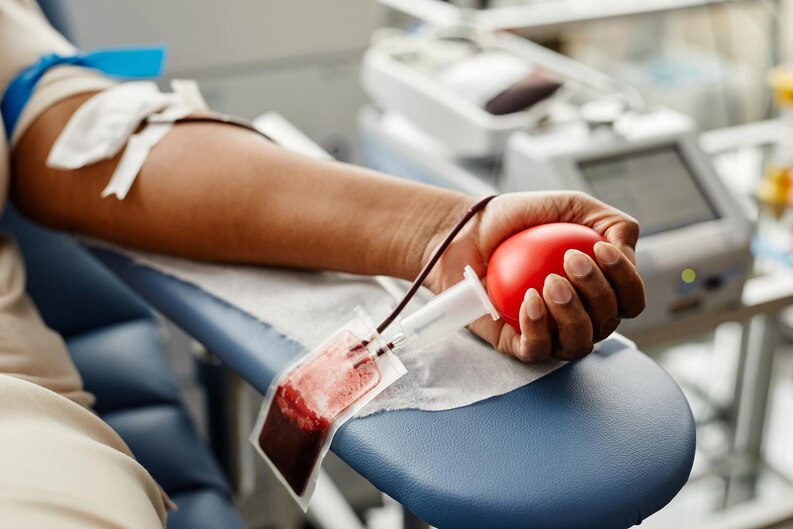POST YOUR BLOOD REQUESTS
Let blood donors find you and help you or your loved ones in this difficult time.


DONATE BLOOD, SAVE LIVES
Safe blood saves lives and improves health. It is the most precious gift that anyone can give to another person: the gift of life.

The Vital Role of Blood Transfusions in Treating Anemia

Anemia, a condition marked by a lack of healthy red blood cells, can lead to symptoms such as fatigue, weakness, and shortness of breath. In severe cases, it can even become life-threatening. Blood transfusions are often necessary in managing anemia when the condition worsens or becomes acute.
Red blood cells carry oxygen throughout the body, and a lack of them means that organs and tissues are deprived of oxygen. Blood transfusions help restore red blood cell levels quickly, improving oxygen delivery and relieving symptoms like dizziness, heart palpitations, and difficulty breathing. This is crucial in cases of severe blood loss or chronic conditions that prevent the body from producing enough red blood cells.
In conditions like aplastic anemia, where the bone marrow fails to produce RBCs, or hemolytic anemia, where red cells are destroyed too quickly, blood transfusions provide temporary relief while long-term treatments are pursued. They also help prevent complications such as heart failure or organ damage by stabilizing the patient’s red blood cell count.
Though generally safe, blood transfusions are carefully monitored due to potential risks like allergic reactions. Despite this, their ability to provide immediate and sometimes life-saving benefits makes them a critical intervention in the treatment of severe anemia.
Blood Transfusions in Treating Sickle Cell Disease

Sickle cell disease (SCD) is a genetic blood disorder that affects the shape and function of red blood cells. In SCD, red blood cells become rigid and crescent-shaped (like a sickle) rather than the typical flexible, round shape. These abnormally shaped cells can block blood flow in small blood vessels, leading to painful episodes known as sickle cell crises, organ damage, and an increased risk of infection. Blood transfusions are a crucial treatment option for many patients with sickle cell disease, helping to manage severe symptoms and prevent complications.
The Crucial Role of Blood Transfusions in Managing Hemophilia

Hemophilia is a rare genetic disorder that impairs the body’s ability to form blood clots. This condition is caused by a deficiency or absence of clotting factors—proteins in the blood that work together to stop bleeding after an injury. As a result, people with hemophilia can experience prolonged bleeding from minor cuts, bruises, or even spontaneous internal bleeding in joints and muscles. While hemophilia is a lifelong condition, treatments like blood transfusions play a critical role in managing bleeding episodes and preventing severe complications.
BLOGS
Myths and Facts About Blood Donation
Many people hesitate to donate blood due to misconceptions and myths surrounding the process. Let’s clear up some of the most common myths with facts to encourage more people to do…
Read MoreThe Lifesaving Impact of Blood Donation
Blood donation is a simple act of generosity that can profoundly impact the lives of people facing medical emergencies, surgeries, or chronic conditions. Every donation can save mu…
Read MoreHow Donated Blood is Used in Medical Treatments
When someone donates blood, it can be separated into different components, each serving a unique purpose in treating various medical conditions. Here’s how donated blood is u…
Read MoreUnderstanding the Need for Blood Transfusions in Anemia: A Lifesaving Intervention
Anemia is a condition characterized by a deficiency of red blood cells (RBCs) or hemoglobin, the protein within RBCs responsible for transporting oxygen throughout the body. As a r…
Read MoreThe Role of Blood Transfusions in Treating Sickle Cell Disease
Sickle cell disease (SCD) is a genetic blood disorder that affects the shape and function of red blood cells. In SCD, red blood cells become rigid and crescent-shaped (like a sickl…
Read MoreThe Crucial Role of Blood Transfusions in Managing Hemophilia
Hemophilia is a rare genetic disorder that impairs the body’s ability to form blood clots. This condition is caused by a deficiency or absence of clotting factors—proteins in…
Read More
